Are you still unsure if electric radiator models are right for you? Maybe you’re worried they won’t work well or that they’re just like every other heater out there.
This guide will show you the benefits of switching to smart heating with electric radiators. At Best Electric Radiators, we focus on offering modern heating solutions that are worth the investment.
Check out our Trustpilot reviews. We’re the top-rated electric radiator company, loved by customers since 2014. Don’t just take our word for it—see what others are saying: Trustpilot Reviews.
To help you decide, we’ll present the top 12 benefits of switching to smart heating with electric radiator models. These are long-term solutions to everyday heating problems.

1. Save Money on Energy Bills
Switching to smart heating with electric radiators helps you save money by using energy more efficiently. These systems heat your home only when needed, so you avoid wasting energy. Traditional heaters often run too much, which leads to higher bills.
Best Practices to Maximise Savings:
- Set Heating Schedules: Program your heating to match your daily routine so it runs only when necessary.
- Use Zoning: Heat only your rooms to avoid wasting energy on empty spaces.
- Regular Maintenance: Regular maintenance is crucial for keeping your electric radiators in good condition. This ensures they run efficiently and extends their lifespan, providing you with long-term savings and comfort.
2. Comfort with Room-by-Room Heating
Smart electric radiators let you control the temperature in each room separately. This means you can heat the rooms you’re using and save energy for others. Traditional systems heat the whole house the same, often wasting energy in unused spaces.
Best Practices for Room-by-Room Heating:
- Install Smart Thermostatic Radiator Valves (TRVs): Control the temperature in each room individually.
- Regularly Review Room Usage: Adjust settings based on changes in how rooms are used to ensure comfort where needed.
3. Control Your Heating from Anywhere
With smart heating, you can adjust your home’s temperature from your phone, even when you’re away. This ensures your home is always comfortable, regardless of your location. In contrast, traditional heaters require you to be home to make any changes, which can be inconvenient and wasteful.
Best Practices for Remote Heating Control:
- Regularly Update Settings: Adjust your heating based on changes in your schedule or the weather.
- Use Geofencing: Set your system to adjust automatically when you leave or approach home.
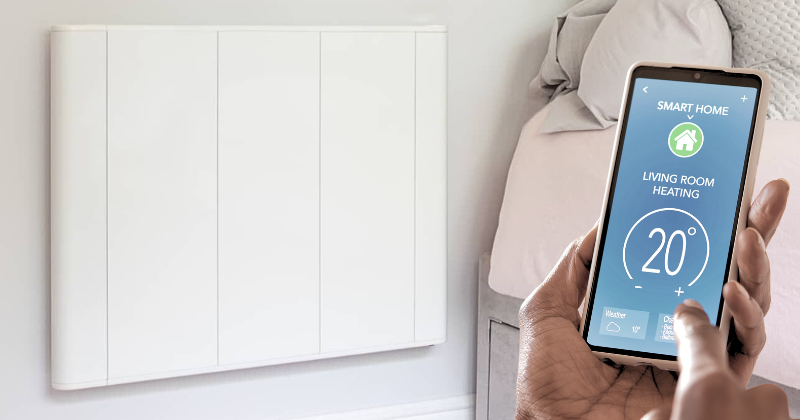
4. Smart Learning for Perfect Heating
Electric radiators with smart learning features adapt to your routine, keeping your home comfortable without wasting energy. The system learns when you need heat and adjusts automatically, providing a consistent and comfortable environment. Traditional heaters can’t do this, often leading to inconsistent temperatures.
Best Practices for Smart Learning:
- Initial Setup: Spend time configuring your system so it learns your habits accurately.
- Review and Adjust: Review your settings and adjust as your routine changes.
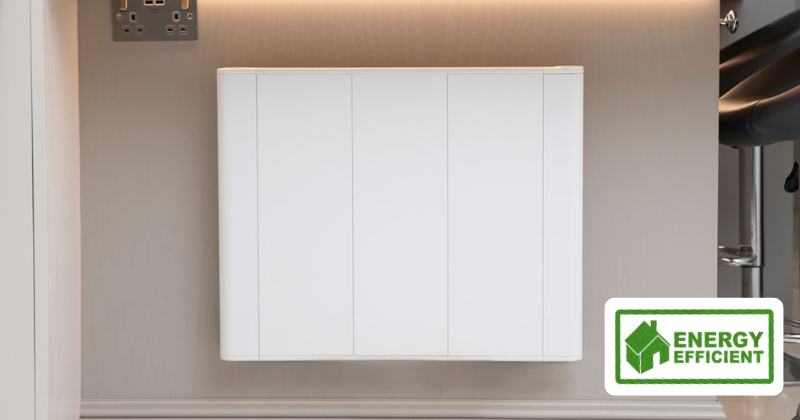
5. Help the Environment
Using smart heating with electric radiators helps reduce carbon emissions by using energy more wisely. They heat your home only when necessary, reducing wasted energy and contributing to a healthier environment. Traditional systems often consume more energy than needed, which harms the environment.
Best Practices for Environmentally Friendly Heating:
- Monitor Energy Use: Use energy reports to track and minimise your consumption.
- Integrate with Renewable Energy: Connect your system to solar panels or other renewable sources.

6. Increase Your Home’s Value
Upgrading to an intelligent heating system can make your home more attractive to buyers and boost its value. Energy-efficient and tech-savvy homes are in high demand, appealing to modern buyers looking for convenience and savings. In contrast, homes with outdated heating systems may not stand out in today’s market.
Best Practices for Increasing Home Value:
- Choose Reputable Brands: Invest in high-quality electric radiators like those offered by Best Electric Radiators, known for top customer satisfaction and reliable performance. See what our customers say here.
- Highlight Energy Efficiency: Emphasise the potential for energy savings for potential buyers.
- Market the Smart Features: Showcase your smart heating system’s convenience and advanced features.
- Keep Documentation: Maintain installation records and any certifications to show buyers.
- Regular Maintenance: Ensure the system is well-maintained and in good working order.
- Update Other Smart Home Features: To increase appeal, integrate the heating system with other smart technologies, like lighting and security.
7. Set Heating Schedules that Fit Your Life
Setting up heating schedules that fit your lifestyle ensures that your home is warm when you need it and energy-efficient when you don’t. Traditional heaters often lack this flexibility, leading to inefficiency and higher bills.
Best Practices for Setting Heating Schedules:
- Align with Your Routine: Set the heating to turn on just before you wake up or return home.
- Use Weekday and Weekend Settings: Differentiate between your weekday and weekend routines.
- Adjust for Seasonal Changes: Update your schedules as the weather changes.
- Monitor Usage and Adjust: Review your energy usage regularly to fine-tune your schedules.
- Use Vacation Mode: Set your system to reduce heating when you’re away for extended periods.
- Incorporate Zoned Heating: Tailor schedules for different rooms based on usage patterns.
8. Know How Much Energy You’re Using
Advanced heating systems provide detailed insights into your energy use, helping you identify where to save more. Traditional setups lack this feedback, making managing and reducing energy consumption harder.
Best Practices for Monitoring Energy Use:
- Review Energy Reports Regularly: Check your usage reports weekly to identify trends and potential savings.
- Set Usage Alerts: Receive notifications if your energy consumption exceeds certain thresholds.
- Compare Historical Data: Look at past usage to see how changes in behaviour affect your bills.
- Use Energy-Saving Modes: Enable eco modes during times of low activity.
- Integrate with Smart Metres: Connect to a smart metre for more accurate tracking.
- Adjust Heating Based on Data: Use insights from your reports to make informed decisions about your settings.
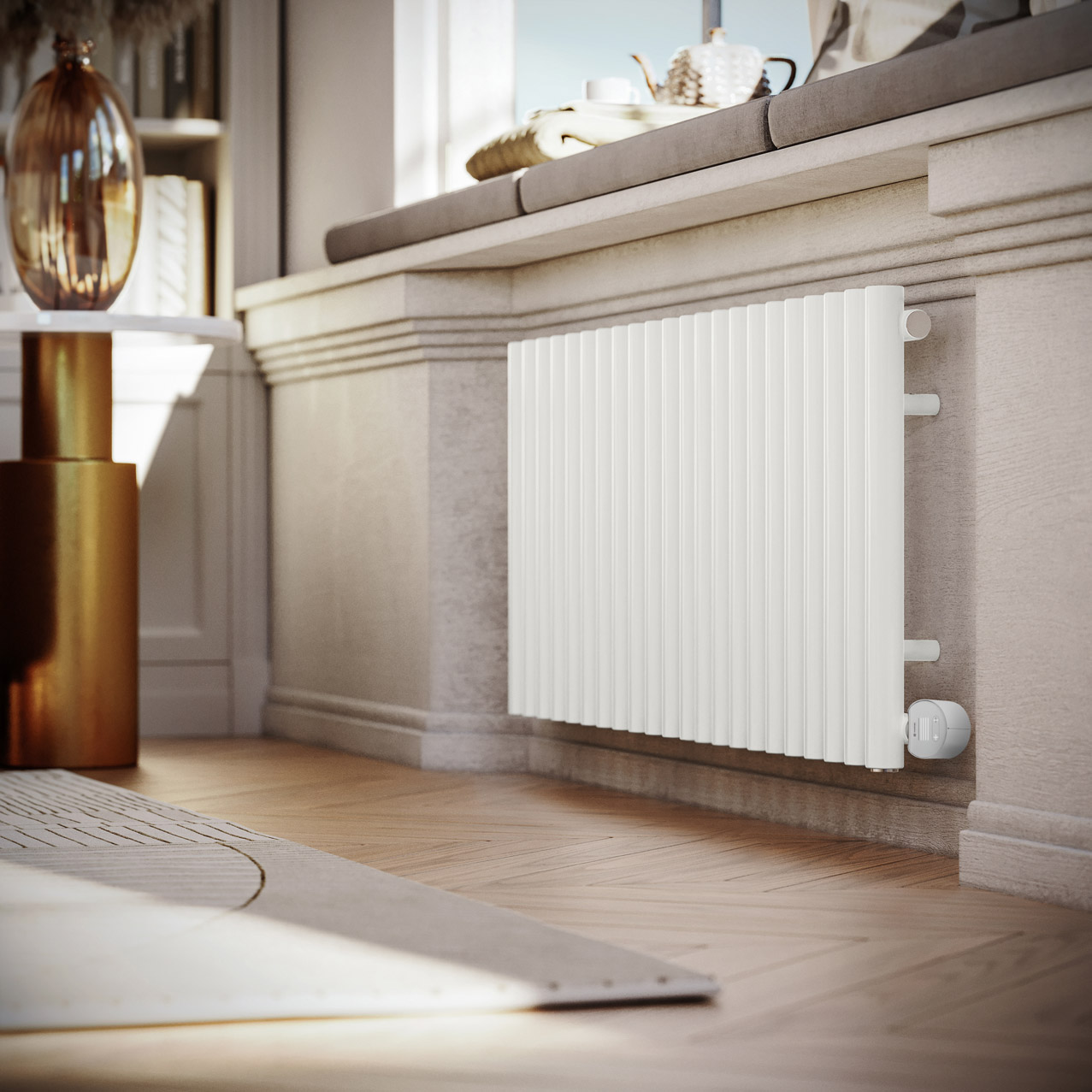
9. Automatic Adjustments Based on Your Location
Geofencing technology can automatically adjust the temperature based on your location. This means your home is always comfortable when you’re there and energy-efficient when you’re not. Traditional systems lack this feature, often leading to unnecessary heating.
Best Practices for Geofencing:
- Activate Geofencing: Ensure this feature is enabled in your system’s app.
- Set Appropriate Trigger Zones: Adjust the geofencing range to fit your lifestyle, such as when you’re within a certain distance from home.
- Combine with Schedules: Use geofencing alongside scheduled heating for even more efficiency.
- Monitor Geofencing Performance: Regularly check how well the feature works and adjust as needed.
- Consider Family Members: Set up geofencing for multiple users in the household.
- Adjust for Different Modes: Set different geofencing rules for workdays and weekends.
10. Keep Up with the Times
Upgrading your heating system ensures your home stays modern and compatible with new smart home technologies. Traditional systems are becoming outdated and may need to be integrated better with other devices.
Best Practices for Future-Proofing:
- Choose Upgradable Systems: Select systems that offer software updates and are compatible with future technologies.
- Integrate with Other Smart Devices: For a seamless experience, connect your heating system with smart lighting, security, and voice assistants.
- Regularly Update Software: Keep your system’s software up to date to ensure it operates efficiently.
- Monitor Technological Trends: Stay informed about new smart home innovations that can complement your heating system.
11. Better Air Quality at Home
Advanced heating systems help maintain indoor air quality by preventing overheating and regulating humidity levels. Traditional systems often cause dry air, leading to discomfort and potential health issues.
Best Practices for Maintaining Air Quality:
- Monitor Humidity Levels: Use a humidity sensor to track indoor air quality and adjust settings accordingly.
- Avoid Overheating: Set your system to moderate temperatures to prevent dry air.
- Use Smart Ventilation: Integrate your heating with intelligent ventilation systems to ensure fresh air circulation.
- Regular Filter Checks: If your system has filters, clean or replace them regularly to maintain air quality.
12. Live More Sustainably
Switching to a modern heating system supports sustainable living by reducing energy waste and promoting efficient energy use. Traditional setups often waste energy, which isn’t good for the environment.
Best Practices for Sustainable Heating:
- Prioritise Energy Efficiency: Set your heating system to prioritise energy savings using eco modes or lower temperatures.
- Use Renewable Energy: Pair your system with renewable energy sources like solar panels for a greener home.
- Track and Reduce Carbon Footprint: Monitor your system’s energy use and aim to reduce your overall carbon emissions.
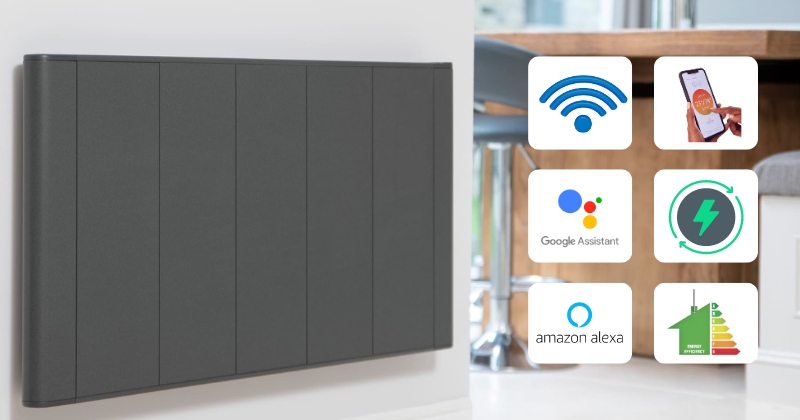
Smart Heating Made Simple With Best Electric Radiator
Smart heating offers clear benefits for modern living. It saves money by using energy only when needed. It lets you control the temperature in each room, giving you comfort without waste. These systems also help the environment by reducing energy use and carbon emissions.
Traditional heaters can be expensive to run and often lack flexibility. Switching to a smart system solves these problems. It’s easy to use, adapts to your routine, and works with renewable energy.
At Best Electric Radiators, we provide top-quality, energy-efficient heating solutions. Our products are designed for your comfort and savings.
We offer a range of best selling models and smart electric radiators that are easy to install. Each unit comes with a comprehensive warranty and fast, reliable delivery.
Upgrading your current system with our products can greatly improve both comfort and cost. We’ve been committed to quality and service since 2014, and our customers love the results.
Frequently Asked Questions
Is a Smart Heating System Worth the Investment?
Yes, a smart heating system is worth it. It helps you save money by using energy more efficiently, offers greater control over your home’s temperature, improves comfort, and can also increase the value of your home.
How Does a Smart Heating System Work with Electric Radiators?
A smart heating system connects to your electric radiators through a smart thermostat or app. It lets you control the temperature in each room and schedule heating times based on your routine.
What are the Benefits of using Smart Radiators?
Smart radiators offer precise temperature control, energy savings, and the ability to heat only the rooms you use. They also provide the convenience of remote control and integration with other smart home devices.
Can I Control Smart Radiators Remotely?
Yes, you can control smart radiators remotely using a smartphone app. This lets you adjust the temperature and settings from anywhere, making it easy to manage your heating even when you’re not home.
Do Smart Radiators Help Reduce Energy Bills?
Yes, smart radiators help reduce energy bills by heating your home more efficiently. They only use energy when needed and allow you to set schedules that match your lifestyle.
Are Smart Heating Systems Compatible with Renewable Energy Sources?
Yes, smart heating systems can be compatible with renewable energy sources like solar panels. This makes your home more energy-efficient and reduces reliance on non-renewable energy.
How Easy Is It to Install a Smart Radiator?
Installing a smart electric radiator is usually straightforward. Many models are designed for easy installation, often requiring a simple swap with your existing radiators. Professional help may be needed for more complex setups.
Will a Smart Thermostat Work with Electric Radiators?
Yes, a smart thermostat can work with electric radiators. It allows you to control the radiators remotely and set heating schedules, making it easy to manage your home’s temperature.
What Features Should I Look for in a Smart Electric Radiator?
Look for features like programmable schedules, remote control via an app, energy usage tracking, and compatibility with other smart home devices. These features ensure you get the most out of your smart electric radiator.
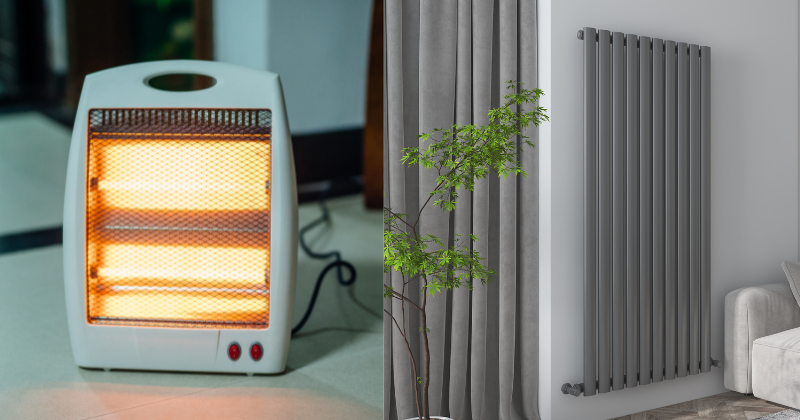





Leave a Reply